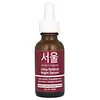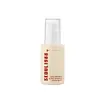What's inside
What's inside
 Key Ingredients
Key Ingredients

 Benefits
Benefits

 Concerns
Concerns

 Ingredients Side-by-side
Ingredients Side-by-side

Water
Skin ConditioningGlycerin
HumectantHamamelis Virginiana Leaf Water
AstringentAloe Barbadensis Leaf Juice
Skin ConditioningSimmondsia Chinensis Seed Oil
EmollientTriticum Vulgare Germ Oil
EmollientHydrolyzed Psoralea Corylifolia Extract
Skin ConditioningSnail Secretion Filtrate
Skin ConditioningCassia Angustifolia Seed Polysaccharide
Skin ConditioningPanax Ginseng Root Extract
EmollientTocopheryl Acetate
AntioxidantCamellia Sinensis Leaf Extract
AntimicrobialPropolis Extract
Skin ConditioningCentella Asiatica Extract
CleansingEquisetum Arvense Extract
AstringentGeranium Maculatum Extract
TonicTaraxacum Officinale Extract
Skin ConditioningHydroxyethyl Ethylcellulose
EmulsifyingCarrageenan
Phenoxyethanol
PreservativeSodium Benzoate
MaskingPotassium Sorbate
PreservativeEthylhexylglycerin
Skin ConditioningWater, Glycerin, Hamamelis Virginiana Leaf Water, Aloe Barbadensis Leaf Juice, Simmondsia Chinensis Seed Oil, Triticum Vulgare Germ Oil, Hydrolyzed Psoralea Corylifolia Extract, Snail Secretion Filtrate, Cassia Angustifolia Seed Polysaccharide, Panax Ginseng Root Extract, Tocopheryl Acetate, Camellia Sinensis Leaf Extract, Propolis Extract, Centella Asiatica Extract, Equisetum Arvense Extract, Geranium Maculatum Extract, Taraxacum Officinale Extract, Hydroxyethyl Ethylcellulose, Carrageenan, Phenoxyethanol, Sodium Benzoate, Potassium Sorbate, Ethylhexylglycerin
Panax Ginseng Root Extract
EmollientWater
Skin ConditioningGlycerin
HumectantDipropylene Glycol
HumectantCaprylic/Capric Triglyceride
Masking1,2-Hexanediol
Skin ConditioningNiacinamide
SmoothingButylene Glycol
HumectantMethyl Gluceth-20
HumectantPolyglyceryl-3 Methylglucose Distearate
EmulsifyingHydrogenated Lecithin
EmulsifyingSorbitan Stearate
EmulsifyingAmmonium Acryloyldimethyltaurate/Vp Copolymer
Macadamia Ternifolia Seed Oil
EmollientCarbomer
Emulsion StabilisingTromethamine
BufferingBetaine
HumectantTocopherol
AntioxidantEthylhexylglycerin
Skin ConditioningHelianthus Annuus Seed Oil
EmollientAdenosine
Skin ConditioningDisodium EDTA
Cholesterol
EmollientPolyglyceryl-10 Oleate
Skin ConditioningBrassica Campestris Sterols
EmollientPhytosteryl/Behenyl/Octyldodecyl Lauroyl Glutamate
Skin ConditioningRetinal
Skin ConditioningSilica
AbrasiveAluminum/Magnesium Hydroxide Stearate
Emulsion StabilisingPotassium Cetyl Phosphate
EmulsifyingPentaerythrityl Tetra-Di-T-Butyl Hydroxyhydrocinnamate
AntioxidantArctium Lappa Root Extract
Skin ConditioningCnidium Officinale Root Extract
Skin ConditioningDioscorea Japonica Root Extract
Skin ConditioningPaeonia Suffruticosa Root Extract
Skin ProtectingRehmannia Chinensis Root Extract
Skin Conditioning3-O-Ethyl Ascorbic Acid
Skin ConditioningBakuchiol
AntimicrobialSh-Oligopeptide-1
Skin ConditioningSh-Oligopeptide-2
Skin ConditioningSh-Polypeptide-1
Skin ConditioningPanax Ginseng Root Extract, Water, Glycerin, Dipropylene Glycol, Caprylic/Capric Triglyceride, 1,2-Hexanediol, Niacinamide, Butylene Glycol, Methyl Gluceth-20, Polyglyceryl-3 Methylglucose Distearate, Hydrogenated Lecithin, Sorbitan Stearate, Ammonium Acryloyldimethyltaurate/Vp Copolymer, Macadamia Ternifolia Seed Oil, Carbomer, Tromethamine, Betaine, Tocopherol, Ethylhexylglycerin, Helianthus Annuus Seed Oil, Adenosine, Disodium EDTA, Cholesterol, Polyglyceryl-10 Oleate, Brassica Campestris Sterols, Phytosteryl/Behenyl/Octyldodecyl Lauroyl Glutamate, Retinal, Silica, Aluminum/Magnesium Hydroxide Stearate, Potassium Cetyl Phosphate, Pentaerythrityl Tetra-Di-T-Butyl Hydroxyhydrocinnamate, Arctium Lappa Root Extract, Cnidium Officinale Root Extract, Dioscorea Japonica Root Extract, Paeonia Suffruticosa Root Extract, Rehmannia Chinensis Root Extract, 3-O-Ethyl Ascorbic Acid, Bakuchiol, Sh-Oligopeptide-1, Sh-Oligopeptide-2, Sh-Polypeptide-1
 Reviews
Reviews

Ingredients Explained
These ingredients are found in both products.
Ingredients higher up in an ingredient list are typically present in a larger amount.
Ethylhexylglycerin (we can't pronounce this either) is commonly used as a preservative and skin softener. It is derived from glyceryl.
You might see Ethylhexylglycerin often paired with other preservatives such as phenoxyethanol. Ethylhexylglycerin has been found to increase the effectiveness of these other preservatives.
Glycerin is already naturally found in your skin. It helps moisturize and protect your skin.
A study from 2016 found glycerin to be more effective as a humectant than AHAs and hyaluronic acid.
As a humectant, it helps the skin stay hydrated by pulling moisture to your skin. The low molecular weight of glycerin allows it to pull moisture into the deeper layers of your skin.
Hydrated skin improves your skin barrier; Your skin barrier helps protect against irritants and bacteria.
Glycerin has also been found to have antimicrobial and antiviral properties. Due to these properties, glycerin is often used in wound and burn treatments.
In cosmetics, glycerin is usually derived from plants such as soybean or palm. However, it can also be sourced from animals, such as tallow or animal fat.
This ingredient is organic, colorless, odorless, and non-toxic.
Glycerin is the name for this ingredient in American English. British English uses Glycerol/Glycerine.
Learn more about GlycerinGinseng root is a well-loved ingredient in Asian skincare for good reason. It hydrates the skin, soothes irritation, and helps even out skin tone.
In traditional East Asian medicine, ginseng has been used for centuries both as food and as a healing remedy, and modern research continues to confirm its skin benefits.
One of the standout features of ginseng is its ability to improve blood circulation and oxygen delivery to the skin, bringing a fresh supply of nutrients to support overall skin health. It also has antioxidant and anti-inflammatory properties. This helps to protect your skin against damage from UV exposure, pollution, and daily stress.
Additionally, studies suggest that ginseng may help reduce hyperpigmentation by inhibiting tyrosinase, the enzyme involved in melanin production.
There are different types of ginseng used in skincare, and while they all share core benefits, their potency can vary.
Most products use fresh or white ginseng because it’s more affordable. However, red ginseng, produced by steaming the root, contains higher levels of ginsenosides, which are compounds with proven anti-aging effects. These ginsenosides help reduce the appearance of wrinkles and improve skin elasticity.
Note: All forms of ginseng are listed simply as “Panax ginseng” in ingredient lists. We recommend reaching out to the brand if you have questions about which type of ginseng is used in their ingredients.
For general antioxidant benefits, any ginseng extract will do, but for wrinkle care or firmer skin, red or fermented ginseng is often more effective.
In short, ginseng is a powerhouse ingredient that supports hydration, radiance, and resilience.
Learn more about Panax Ginseng Root ExtractWater. It's the most common cosmetic ingredient of all. You'll usually see it at the top of ingredient lists, meaning that it makes up the largest part of the product.
So why is it so popular? Water most often acts as a solvent - this means that it helps dissolve other ingredients into the formulation.
You'll also recognize water as that liquid we all need to stay alive. If you see this, drink a glass of water. Stay hydrated!
Learn more about Water